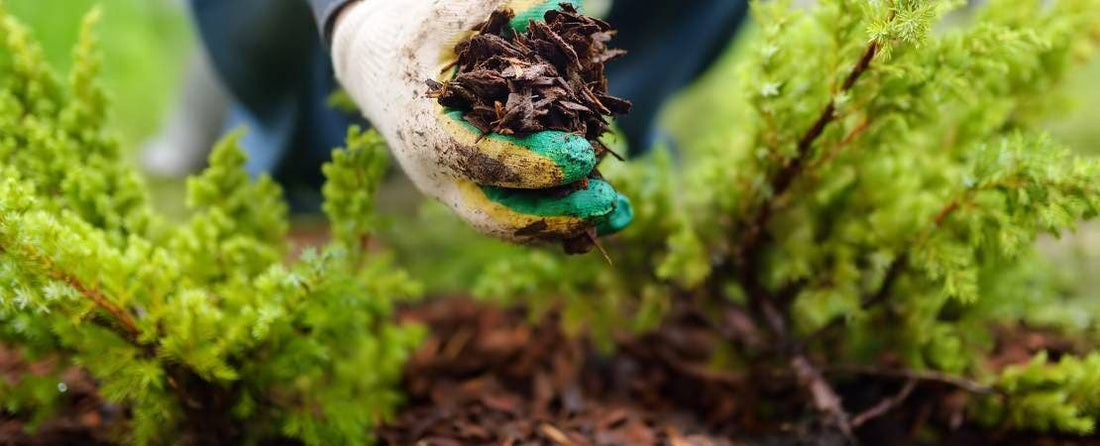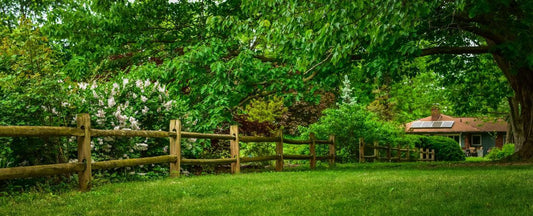What Is Mulch for Gardening?

How Mulching Your Plants Helps Them and You, Too
Mulch is a critical component in any garden. It serves multiple purposes: conserving moisture, suppressing weeds, and protecting plant roots from extreme temperatures. By covering the soil, mulch reduces water evaporation, meaning less frequent watering and a more stable moisture level for plants. This conservation of water is particularly beneficial during dry spells or in arid climates.
There are various types of mulch to choose from, each with its unique benefits:
Organic Mulches
- Straw and Grass Clippings: These are easily decomposable and add nutrients back into the soil as they break down.
- Leaves and Pine Needles: Excellent for acid-loving plants, they improve soil structure and add organic matter as they decompose.
- Bark and Wood Chips: Provide a long-lasting cover that decomposes slowly, improving soil texture and fertility over time.
- Compost: Enriches the soil with nutrients and improves its overall health and structure.
Inorganic Mulches
- Stones and Gravel: Ideal for decorative purposes, they also retain heat which can benefit plant growth in cooler climates.
- Landscape Fabrics and Plastic Sheets: These materials are effective at weed suppression and can be used in vegetable gardens to warm the soil and speed up early growth.
What Are the Benefits of Mulching?
- Moisture Retention: Reduces water usage by minimizing surface evaporation.
- Weed Control: Acts as a barrier, limiting the growth of unwanted plants.
- Temperature Control: Insulates the soil, keeping it warmer in winter and cooler in summer.
- Soil Health: Organic mulches improve soil fertility as they decompose, adding valuable nutrients back into the earth.
Best Practices for Applying Mulch
For optimal results, it's important to apply mulch correctly. Ensure there is a gap between the mulch and the stems of plants to avoid moisture-related diseases. Also, never mulch over newly planted seeds as they may struggle to break through a thick layer.
Whether organic or inorganic, mulching is a beneficial practice that enhances plant health, conserves water, and beautifies the garden.
Do All Plants Benefit from Mulching?
Mulching is a highly beneficial practice for most garden plants, but there are specific considerations depending on the type of plant and the environment.
Plants That Benefit from Mulching
Woody Plants: Trees and shrubs generally benefit from mulching. It helps maintain soil moisture, regulates soil temperature, and reduces weed competition. Mulch should be applied away from the trunk to prevent rot and disease.
Perennials: Many perennials benefit from the insulating effect of mulch, which can protect roots from temperature extremes and help retain soil moisture during dry periods.
Vegetable Gardens: Mulch can help maintain even soil moisture, keep soil temperatures stable, and suppress weeds, which is particularly beneficial for vegetables. Organic mulches like straw or grass clippings are often preferred as they decompose and enrich the soil.
Rose Gardens: Mulch helps retain moisture, which roses love, and prevents soil-borne diseases from splashing up on the plants during rainstorms.
Acid-Loving Plants: Mulches like pine needles or shredded bark can help maintain acidic conditions in the soil, which is beneficial for plants like azaleas, rhododendrons, and blueberries.
Plants That May Not Benefit from Mulching
Desert Plants: Cacti, succulents, and other desert plants prefer a dry, well-drained environment. Over-mulching, especially with moisture-retaining organic materials, can lead to root rot and fungal infections in these plants.
Seedlings: Small seedlings can struggle to push through a thick layer of mulch. It's often better to wait until plants are established before mulching heavily around them.
Plants Prone to Root Rot: Plants that are susceptible to root diseases, such as some types of lavender and rosemary, which prefer very well-drained soils, may suffer from too much moisture retention if over-mulched.
Tips for Effective Mulching
Correct Application: Apply a 2-3 inch layer of mulch around plants, avoiding direct contact with the stems or trunks to prevent moisture-related issues like rot.
Refresh Mulch Regularly :Organic mulch decomposes over time and will need to be replenished. Check and refresh mulch in your garden at least once a year.
Choose the Right Material: Select a mulch type that complements the growing conditions and needs of the specific plants in your garden.
Consider these tips to understand the specific needs of your plants. Use mulching as a powerful tool to enhance the health and beauty of your garden.
FAQ: Mulching in Gardens
What is the best time of year to apply mulch?
Mulch can be applied at any time of the year, but the best times are late spring after the soil has warmed up, and late fall to provide insulation for winter. Avoid mulching too early in spring, as this can delay soil warming and plant growth.
How often should I replace or add more mulch?
Organic mulches decompose over time and typically need to be replenished once a year. Check the depth of your mulch in early spring and add more if it has decomposed to less than 2 inches.
Can mulch attract pests?
Organic mulch can occasionally harbor insects or small rodents. Using a coarser mulch can minimize this risk as it is less inviting for pests to nest in. Always keep mulch away from direct contact with plant stems and building foundations.
Is it possible to mulch too much?
Yes, too much mulch can suffocate plant roots, leading to poor growth and increased susceptibility to disease. A layer of 2-3 inches of mulch is generally sufficient to suppress weeds and retain moisture without harming plants.
What should I do if my mulch develops mold or fungus?
Some types of organic mulch can develop mold or fungus, which is generally harmless but can be unsightly. You can scrape off the affected area and add a thin layer of fresh mulch, or turn the mulch over to improve air circulation and reduce mold growth.
Can I use mulch on my vegetable garden?
Absolutely! Mulch is beneficial in vegetable gardens to retain moisture, suppress weeds, and regulate soil temperature. Organic materials like straw or shredded leaves are especially good for vegetable beds as they also improve soil fertility as they decompose.
How close to plant stems can I apply mulch?
Keep mulch about 2-3 inches away from the bases of plants. This space prevents moisture accumulation around the stems, which can lead to rot and fungal diseases.
Does the type of mulch matter?
Yes, the choice of mulch can affect soil pH, moisture retention, and how quickly it decomposes. For example, pine needles are good for acid-loving plants, while cedar bark can repel some pests but decompose slowly.
Can mulch affect soil pH?
Some mulches, like pine needles and oak leaves, can acidify the soil over time, which is beneficial for acid-loving plants but may not be suitable for others.
Should I remove old mulch before adding new mulch?
It’s not usually necessary to remove old mulch unless it's moldy or there is an overaccumulation. You can simply add a new layer on top of the old, especially if it has partially decomposed, because that adds nutrients back to the soil.


